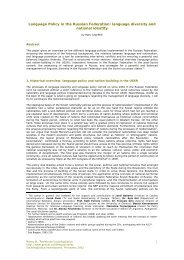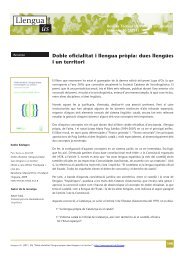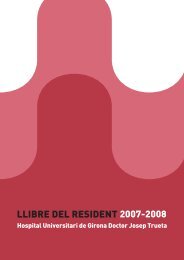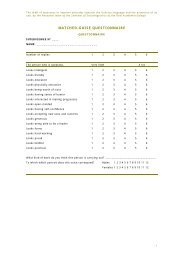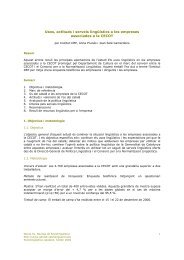Minority Protection and Language Policy in the Czech Republic, by ...
Minority Protection and Language Policy in the Czech Republic, by ...
Minority Protection and Language Policy in the Czech Republic, by ...
You also want an ePaper? Increase the reach of your titles
YUMPU automatically turns print PDFs into web optimized ePapers that Google loves.
<strong>M<strong>in</strong>ority</strong> <strong>Protection</strong> <strong>and</strong> <strong>Language</strong> <strong>Policy</strong> <strong>in</strong> <strong>the</strong> <strong>Czech</strong> <strong>Republic</strong>, <strong>by</strong> Carol<strong>in</strong> Zwill<strong>in</strong>g4.2 Names <strong>and</strong> topographical signsAccord<strong>in</strong>g to §7 of <strong>the</strong> <strong>M<strong>in</strong>ority</strong> Act <strong>the</strong> members of m<strong>in</strong>orities are allowed to use <strong>the</strong>ir names<strong>and</strong> surnames <strong>in</strong> <strong>the</strong>ir language. S<strong>in</strong>ce <strong>the</strong>re are strict conditions determ<strong>in</strong>ed <strong>by</strong> a special Acton registers, names <strong>and</strong> surnames 15 <strong>in</strong> practical terms only female citizen of <strong>the</strong> <strong>Czech</strong><strong>Republic</strong> or <strong>the</strong> parents of a female child under legal age can ask for <strong>the</strong> entry of anunchanged surname <strong>in</strong>to a register, if <strong>the</strong>y make an affidavit of <strong>the</strong>ir membership <strong>in</strong> anational m<strong>in</strong>ority. Although all representatives of national m<strong>in</strong>orities basically embraced thisnew Act on Registers, <strong>the</strong>y underl<strong>in</strong>e that practical problems are not sufficiently reflected.For <strong>in</strong>stance, <strong>the</strong>y criticize <strong>the</strong> adm<strong>in</strong>istrative fee of 1,000 CZK 16 for <strong>the</strong> change of an entry,especially for seniors.In addition, <strong>the</strong> <strong>M<strong>in</strong>ority</strong> Act stipulates that bil<strong>in</strong>gual geographical names, as e.g. forcommunities, streets, public places, build<strong>in</strong>gs of government bodies <strong>and</strong> territorial selfgovern<strong>in</strong>gunits, can be used. 17 But <strong>in</strong> practice, as stated <strong>by</strong> <strong>the</strong> Government’s Report on <strong>the</strong>Situation of National M<strong>in</strong>orities from June 2002 18 , <strong>the</strong> right to <strong>in</strong>scribe communities, streets<strong>and</strong> public places with names <strong>in</strong> <strong>the</strong> m<strong>in</strong>ority language has not been exercised yet. Thisarises probably from <strong>the</strong> fact that this right can be exercised only if 10% of <strong>the</strong> local citizensacknowledge membership <strong>in</strong> a national m<strong>in</strong>ority <strong>and</strong> 40% of adult citizens of <strong>the</strong>m ask forthis <strong>by</strong> petition. In September 2003, <strong>the</strong> Polish-speak<strong>in</strong>g m<strong>in</strong>ority liv<strong>in</strong>g <strong>in</strong> <strong>the</strong> region ofSilesia started to collect signatures for bil<strong>in</strong>gual signs. The largest town, called ÈeskýTìsín/Czeski Cieszyn, was divided <strong>in</strong>to a Polish <strong>and</strong> a <strong>Czech</strong>oslovak part after <strong>the</strong> collapse of<strong>the</strong> Austro-Hungarian Empire <strong>in</strong> 1918. The percentage of <strong>the</strong> Polish-speak<strong>in</strong>g citizensnowadays st<strong>and</strong>s only at 16.1% based on <strong>the</strong> last census. Fur<strong>the</strong>rmore, <strong>the</strong>y entered <strong>in</strong>tonegotiations with <strong>the</strong> <strong>Czech</strong> Interior M<strong>in</strong>istry to <strong>in</strong>troduce bil<strong>in</strong>gual documents as e.g. birth,marriage <strong>and</strong> death certificates. 194.3 MediaBroadcast<strong>in</strong>g media <strong>and</strong> language-related regulations have a strong impact on <strong>the</strong> life ofpersons belong<strong>in</strong>g to m<strong>in</strong>orities. 20 While members of m<strong>in</strong>orities have freedom of access to<strong>the</strong> media, at <strong>the</strong> same time, <strong>the</strong> broadcasters 21 have <strong>the</strong> right, guaranteed <strong>by</strong> law, tobroadcast <strong>the</strong>ir programmes freely <strong>and</strong> <strong>in</strong>dependently. Therefore, <strong>in</strong>terference with <strong>the</strong>sebroadcasters is only permitted on <strong>the</strong> basis of <strong>the</strong> law <strong>and</strong> with<strong>in</strong> its limits.The Law on <strong>Czech</strong> Television of 1991 22 (CT) states that among <strong>the</strong> ma<strong>in</strong> tasks of CT is <strong>the</strong>creation <strong>and</strong> transmission of programmes <strong>and</strong> <strong>the</strong> provision of a balanced selection ofprogrammes to all sections of <strong>the</strong> population with regard to <strong>the</strong>ir ethnic or nationalbackground <strong>and</strong> national identity <strong>and</strong> <strong>the</strong> development of <strong>the</strong> cultural identity of <strong>the</strong>population of <strong>the</strong> <strong>Czech</strong> <strong>Republic</strong>, <strong>in</strong>clud<strong>in</strong>g members of national m<strong>in</strong>orities. But <strong>in</strong> practice,m<strong>in</strong>ority languages are still not used <strong>in</strong> public television. Because of <strong>the</strong> severe criticism <strong>by</strong>representatives of national m<strong>in</strong>orities, <strong>the</strong> Council of Government for National M<strong>in</strong>oritieslaunched <strong>in</strong>itiatives for <strong>the</strong> improvement of co-operation between CT <strong>and</strong> national m<strong>in</strong>orities.The Broadcast<strong>in</strong>g Act on radio <strong>and</strong> television of 2001 23 deals with <strong>the</strong> rights <strong>and</strong> dutiesconcern<strong>in</strong>g <strong>the</strong> programme content. As well as <strong>in</strong>sist<strong>in</strong>g <strong>in</strong> objective <strong>and</strong> balanced news <strong>and</strong>current affairs programm<strong>in</strong>g, it imposes additional responsibilities on <strong>the</strong> statutorybroadcaster <strong>by</strong> requir<strong>in</strong>g <strong>in</strong> Article 31(4) a preparation of a programme structure “so as toprovide, <strong>in</strong> its broadcast<strong>in</strong>g, a well-balanced portfolio offered to all <strong>the</strong> population withrespect to <strong>the</strong>ir age, gender, color of <strong>the</strong> sk<strong>in</strong>, faith, religion, political or o<strong>the</strong>r op<strong>in</strong>ions,ethnic, national or social orig<strong>in</strong>, <strong>and</strong> membership of a m<strong>in</strong>ority”. Never<strong>the</strong>less, m<strong>in</strong>ority15 Act N. 301/2001.16 $ 1=27 CZK ca. on March 16, 2004.17 § 29/2 of Act N. 1128/2000 Coll. on communities.18 At http://wtd.vlada.cz/files/rvk/rnm/zprava_mens<strong>in</strong>y_2001_en.pdf.19 For fur<strong>the</strong>r <strong>in</strong>formation see.20 For general <strong>in</strong>formation <strong>and</strong> as an overview about all OSCE countries see <strong>the</strong> study commissioned <strong>by</strong><strong>the</strong> OSCE High Commissioner on National M<strong>in</strong>orities on <strong>M<strong>in</strong>ority</strong>-<strong>Language</strong> Related Broadcast<strong>in</strong>g <strong>and</strong>Legislation <strong>in</strong> <strong>the</strong> OSCE, at .21 In December 2003, <strong>the</strong>re is one national public television operator (with two channels), two privatetelevision operators, 12 regional television operators, 16 local television operators, 10 satellite operators<strong>and</strong> 11 cable operators.22 Law N. 483/1991 as subsequently amended <strong>by</strong> Law N. 39/2001, at .23 Law N. 231/2001, at .Noves SL. Revista de Sociol<strong>in</strong>güísticahttp://www.gencat.cat/llengua/novesAutumn 20044


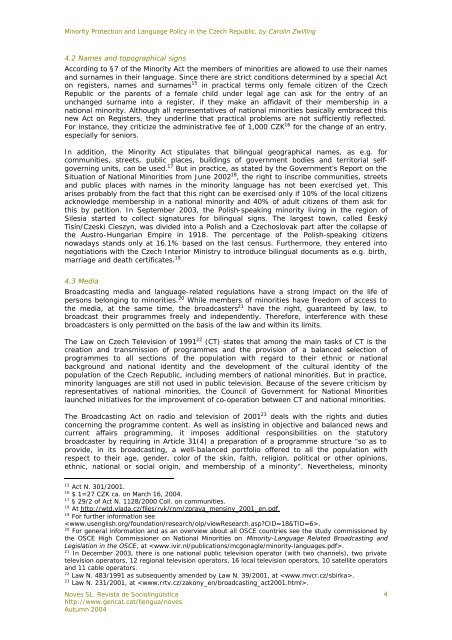
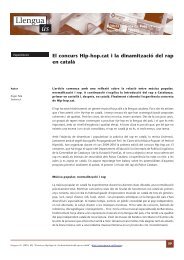
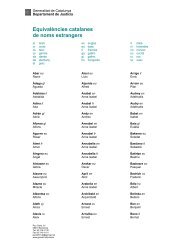
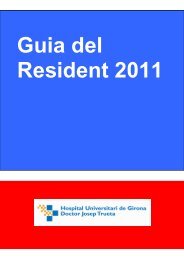

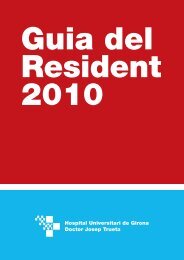
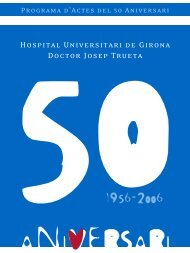
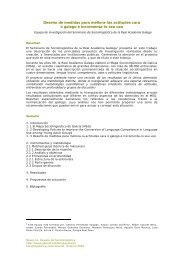
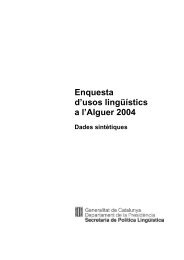
![Mestres, J.M. [et. al]. Manual d'estil: la redacció i l'edició de textos](https://img.yumpu.com/31252673/1/184x260/mestres-jm-et-al-manual-destil-la-redaccia-i-ledicia-de-textos.jpg?quality=85)
